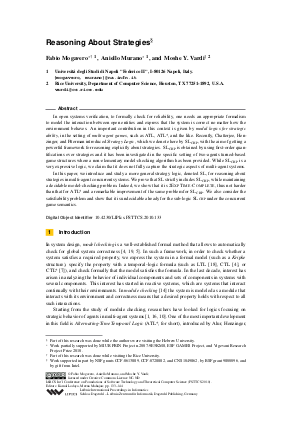Reasoning About Strategies
Authors Fabio Mogavero, Aniello Murano, Moshe Y. Vardi
-
Part of:
Volume:
IARCS Annual Conference on Foundations of Software Technology and Theoretical Computer Science (FSTTCS 2010)
Part of: Series: Leibniz International Proceedings in Informatics (LIPIcs)
Part of: Conference: IARCS Annual Conference on Foundations of Software Technology and Theoretical Computer Science (FSTTCS) - License:
 Creative Commons Attribution-NonCommercial-NoDerivs 3.0 Unported license
Creative Commons Attribution-NonCommercial-NoDerivs 3.0 Unported license
- Publication Date: 2010-12-14
File

PDF
LIPIcs.FSTTCS.2010.133.pdf
- Filesize: 241 kB
- 12 pages
Document Identifiers
Subject Classification
Keywords
- open systems
- multi-agent systems
- verification
- strategy quantifier
- alternating temporal logic
- model-checking
Metrics
- Access Statistics
-
Total Accesses (updated on a weekly basis)
0Document
0Metadata
Abstract
In open systems verification, to formally check for reliability, one needs an appropriate formalism to model the interaction between open entities and express that the system is correct no matter how the environment behaves. An important contribution in this context is given by modal logics for strategic ability, in the setting of multi-agent games, such as ATL, ATL*, and the like. Recently, Chatterjee, Henzinger, and Piterman introduced Strategy Logic, which we denote here by SL-CHP, with the aim of getting a powerful framework for reasoning explicitly about strategies. SL-CHP is obtained by using first-order quantifications over strategies and it has been investigated in the specific setting of two-agents turn-based game structures where a non-elementary model-checking algorithm has been provided. While SL-CHP is a very expressive logic, we claim that it does not fully capture the strategic aspects of multi-agent systems. In this paper, we introduce and study a more general strategy logic, denoted SL, for reasoning about strategies in multi-agent concurrent systems. We prove that SL strictly includes SL-CHP, while maintaining a decidable model-checking problem. Indeed, we show that it is 2ExpTime-complete, thus not harder than that for ATL* and a remarkable improvement of the same problem for SL-CHP. We also consider the satisfiability problem and show that it is undecidable already for the sub-logic SL-CHP under the concurrent game semantics.
Cite As Get BibTex
Fabio Mogavero, Aniello Murano, and Moshe Y. Vardi. Reasoning About Strategies. In IARCS Annual Conference on Foundations of Software Technology and Theoretical Computer Science (FSTTCS 2010). Leibniz International Proceedings in Informatics (LIPIcs), Volume 8, pp. 133-144, Schloss Dagstuhl – Leibniz-Zentrum für Informatik (2010)
https://doi.org/10.4230/LIPIcs.FSTTCS.2010.133
BibTex
@InProceedings{mogavero_et_al:LIPIcs.FSTTCS.2010.133,
author = {Mogavero, Fabio and Murano, Aniello and Vardi, Moshe Y.},
title = {{Reasoning About Strategies}},
booktitle = {IARCS Annual Conference on Foundations of Software Technology and Theoretical Computer Science (FSTTCS 2010)},
pages = {133--144},
series = {Leibniz International Proceedings in Informatics (LIPIcs)},
ISBN = {978-3-939897-23-1},
ISSN = {1868-8969},
year = {2010},
volume = {8},
editor = {Lodaya, Kamal and Mahajan, Meena},
publisher = {Schloss Dagstuhl -- Leibniz-Zentrum f{\"u}r Informatik},
address = {Dagstuhl, Germany},
URL = {https://drops.dagstuhl.de/entities/document/10.4230/LIPIcs.FSTTCS.2010.133},
URN = {urn:nbn:de:0030-drops-28597},
doi = {10.4230/LIPIcs.FSTTCS.2010.133},
annote = {Keywords: open systems, multi-agent systems, verification, strategy quantifier, alternating temporal logic, model-checking}
}
